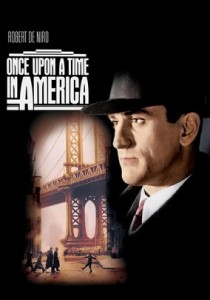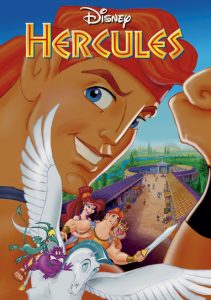Once Upon a Time in America-1984
Director Sergio Leone
Starring Robert De Niro, James Woods
Top 250 Films #85
Scott’s Review #218
Reviewed January 19, 2015
Grade: A
An epic film, the extended directors cut at more than four hours in length, 1984’s Once Upon a Time in America is a film directed by Sergio Leone, who also directed the 1968 masterpiece Once Upon a Time in the West and numerous other westerns starring Clint Eastwood.
This particular film is in a different vein and not to be confused as any sort of sequel or related to the aforementioned film- this time Leone explores the crime drama genre rather than the western and does so in remarkable fashion.
The film tells the story of a group of Jewish friends who became involved in organized crime during the 1920s in New York City.
The main story is told via flashbacks as the central character, Noodles, played by Robert De Niro, returns to Brooklyn thirty years later to reunite with his former mobster friends.
In this way, the film is sectioned- the group of youngsters and kids and the same characters as adults.
Once Upon a Time in America has been met with much controversy since it was made. At the time of its release, the film was butchered as over an hour of footage was cut by the studio heads making the film largely uneven.
Fortunately, the restored version, at over three hours in length, is available for viewing. Furthermore, the director cut clocks in at well over four hours, and is the best version to watch. Due to so many cuts, other versions appear shoddy and out of order making the viewing experience difficult.
Once Upon a Time in America is largely underappreciated except for the die-hard cinema lovers most patient with the film, and deserves mention as an excellent crime epic drama.
The film contains many similarities to The Godfather and The Godfather Part II and the role De Niro plays is not too different from Vito Corleone in Part II.
However, the greatest contrast is that Once Upon a Time in America is more visually artistic than The Godfather films.
The film centers mainly on Noodle’s perspective as he enjoys youth in the Lower East Side of Manhattan where he meets his group of lifelong friends.
The focal point is his friendship with Max, the adult character played by James Woods, and his undying love for Deborah, played by Elizabeth McGovern as an adult.
As kids, they are worry-free, but gradually fall in with a group of older mobsters, first doing their dirty work, followed by venturing out on their own.
The themes of the film are loyalty, childhood friendship, betrayal, and greed as all of the characters change (or die) in the time that the film takes place.
When a mysterious letter forces Noodles to resurface in Brooklyn, we begin to understand the back story and the history between the friends as layers are slowly peeled back.
The film drags slightly in the middle section, but the first part and last parts are very well-made and absorbing.
Leone has a way of pacing the film that works- it is methodical, and nuanced, with wonderful set pieces and each period explored- 1920s, 1930s, and 1960s seem equally as authentic as the next one does.
I especially enjoyed the 1920s art direction- it revealed such a state of genuineness and felt like truly there in that period.
The relationship between Noodles and Deborah is an interesting one worth mentioning. Falling in love as youngsters (when Deborah was played by a very young Jennifer Connelly) they had an innocent, puppy-love relationship.
As adults, due to a violent, disgraceful act, their tender relationship is subsequently ruined and one might argue one of the characters turns quite unsympathetic.
Once Upon a Time in America (1984) is a sprawling epic film sure to be enjoyed by intelligent fans of the crime epic drama genre and specifically Sergio Leone fans- an underappreciated gem.

